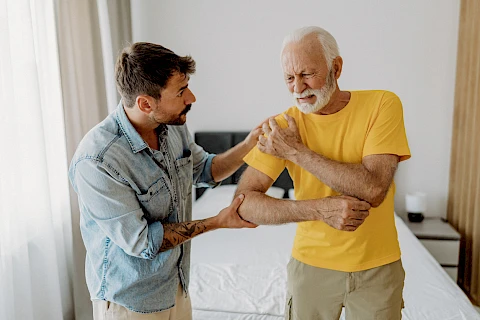
As individuals age, they often experience various forms of pain due to chronic conditions, injuries, or the natural wear and tear on their bodies. For senior caregivers, understanding and effectively managing pain is critical to ensuring the comfort and well-being of their loved ones. Caregivers provide invaluable support in implementing appropriate pain management strategies. This article explores various pain management techniques that caregivers can use to help seniors feel more comfortable and engaged in their daily activities.
Chronic Pain in Seniors
Chronic pain in seniors can stem from various conditions. Common causes include arthritis, neuropathy, and past injuries. Chronic pain can interfere with daily activities like walking, cooking, and even sleeping. It can also affect mental health, leading to anxiety and depression. Understanding these issues is the first step in providing effective pain management.
Practical Pain Management Techniques
Managing chronic pain involves a mix of non-pharmacological methods and lifestyle adjustments. These techniques can be easily incorporated into daily routines.
Gentle exercises and physical therapy can help reduce pain and improve mobility. Activities like walking, swimming, and yoga can be beneficial. Seniors should always consult with a doctor before starting a new fitness routine. Applying heat can relax muscles and improve blood flow, while cold therapy can reduce inflammation and numb sore areas. Massage and acupuncture are alternative therapies that can provide relief from chronic pain. Massage can reduce muscle tension, and acupuncture can help manage pain by targeting specific pressure points.
Lifestyle Adjustments
Certain lifestyle adjustments can also help with pain management. A balanced diet rich in fruits, vegetables, and lean proteins can help manage pain. Staying hydrated is also crucial for overall health.
Ensure your loved one gets adequate rest by maintaining a consistent sleep schedule and creating a comfortable sleep environment. Techniques such as deep breathing, meditation, and gentle stretching can help manage pain by reducing stress and tension.
Working With Healthcare Providers
Regular medical check-ups can help monitor and adjust pain management strategies as needed. Routine visits to healthcare providers ensure that any changes in pain levels or new symptoms are addressed promptly.
Clearly communicate the senior's pain levels, triggers, and what methods have been effective. This helps healthcare providers tailor their recommendations. If medications are part of the pain management plan, ensure they are taken as prescribed. Monitor for side effects and discuss any concerns with the healthcare provider.
Supporting Overall Well-Being
Pain management is just one part of caring for a senior loved one. Supporting their overall well-being is equally important. Social engagement can improve mood and distract from pain. Encourage participation in community activities or social clubs.
Chronic pain can take a toll on mental health. Encourage activities that boost mental well-being, such as hobbies, reading, or mindfulness exercises. Ensure the living space is safe and comfortable. This includes proper lighting, comfortable furniture, and easy access to essential items.
Help Seniors Be Comfortable and Safe
By understanding the causes and impacts of chronic pain, using practical pain management techniques, working closely with healthcare providers, and supporting overall well-being, caregivers can significantly improve the quality of life for their loved ones.
For those in Arlington, Alexandria, Falls Church, and Fairfax County, contact us at Senior Helpers Arlington-Alexandria, VA, for professional caregiving support. Implementing these strategies can make a meaningful difference in managing chronic pain and enhancing daily life for seniors.